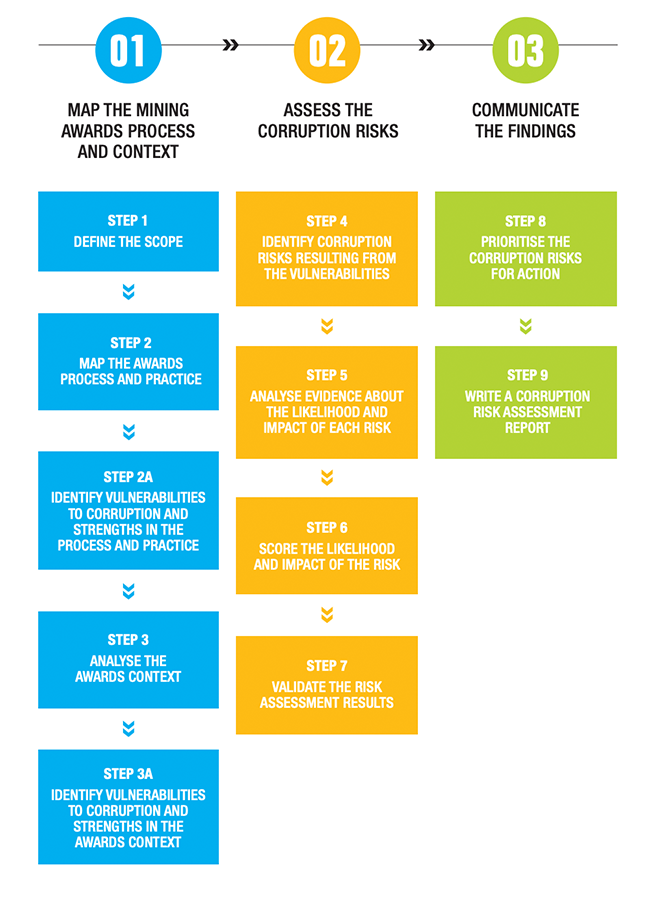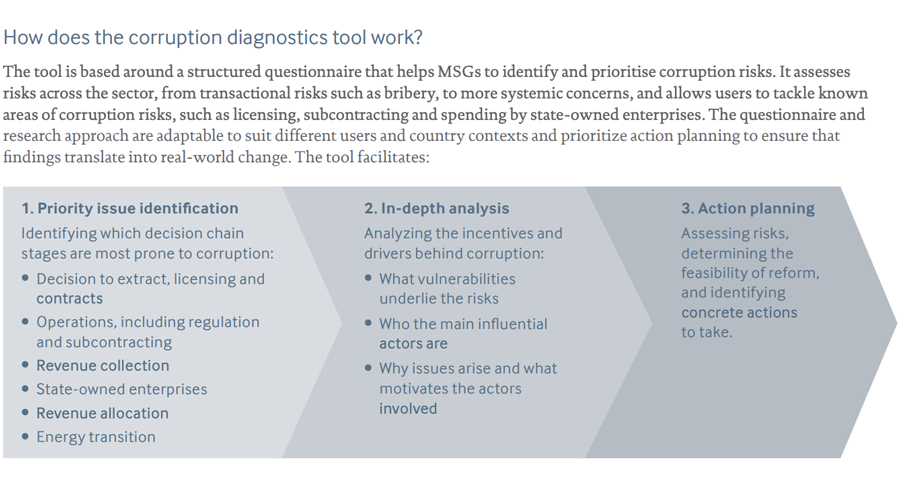
Using Transparency to Mitigate Corruption
On International Anti-Corruption Day, the Extractive Industries Transparency Initiative, NRGI and Transparency International Accountable Mining are partnering to present new tools and guidance to combat extractive sector corruption. (This post also appears on the EITI website.)
The extractive sector is notoriously prone to corruption, accounting for one in five cases of transnational bribery according to the OECD. There have always been great expectations about the role of transparency in addressing corruption risks in the extractive industries. This is not surprising.
To this end, EITI stakeholders have been working to strengthen the contribution that the EITI can make to anti-corruption efforts. The EITI International Secretariat, the Natural Resource Governance Institute (NRGI) and Transparency International’s Accountable Mining Programme have jointly developed new analyses and tools to support EITI implementing countries in using the EITI to mitigate corruption risks.
The new resources were recently presented at a virtual event, where EITI country-level multi-stakeholder groups (MSGs) were invited to discuss opportunities and support needs for advancing anti-corruption efforts. Here are five key takeaways:
1. Anti-corruption work is high priority
There is a high level of interest among MSG stakeholders for the EITI to contribute more to anti-corruption efforts in implementing countries. The event was attended by almost 100 participants from 25 countries, demonstrating broad recognition of the importance of the fight against corruption in the extractives sector - particularly considering the impacts of the COVID-19 pandemic on the industry and the growing urgency of energy transition.
2. The EITI is a good platform for mitigating corruption risks
Some EITI implementing countries have already been actively using the EITI framework to support their anti-corruption efforts - although there is a general acknowledgement that more can be done. Examples from Argentina, Ukraine and Mauritania presented during the event demonstrated this. Participants agreed that EITI MSGs could contribute more to anti-corruption by identifying recommendations for relevant reforms, improving transparency around potential risk areas, and helping extractives and anti-corruption experts to work together. By building on existing initiatives and reforms related to anti-corruption efforts, the EITI can increase its likelihood of success and impact.
3. There are clear priorities for anti-corruption work
Corruption risks exist along the whole value and decision chain of extractives, but there are some clear emerging priority areas for action. MSG representatives highlighted opportunities related to public officials holding interests in the industry (beneficial ownership transparency), agreements and licensing of extractive projects (contract transparency), and subcontracting and procurement.
When they are opaque, ownership structures and contracts related to extractive projects can be high-risk areas for corruption. State-owned enterprises and tax regimes can also raise red flags when governance structures are weak. The EITI Standard includes requirements to disclose information in these areas, reducing potential avenues for illicit practices. Yet some MSGs have identified subcontracting as a high-risk area for corruption and a blind spot in EITI reporting, underscoring the need for more disclosure in this space.
4. Mitigating corruption is no easy feat
Many stakeholders are keen to use the EITI in the fight against corruption, but also recognise the obstacles and challenges ahead. In some countries, anti-corruption is still perceived to be too politically sensitive. There is a common understanding that the EITI is not involved in law enforcement or investigation of corruption cases; but a number of stakeholders have expressed concern around the EITI’s role in anti-corruption, citing the absence of a clear mandate to work on the issue.

During the event, 30 MSG participants were surveyed about the opportunities and challenges of addressing corruption.
Nonetheless, there is also an acknowledgment among implementing countries that the EITI is already addressing and mitigating corruption through ongoing work on beneficial ownership, contract transparency and SOE reforms. Yet event participants expressed that limitations to financial and human resources present a significant challenge for advancing anti-corruption work. In this context, the new analysis, initiatives and tools can support anti-corruption efforts even in environments where resources are scarce.
5. There are tools to support anti-corruption efforts
There are a number of innovative resources available to support MSGs in advancing anti-corruption efforts.

Image: TI Accountable Mining’s ≈l (Mining Awards Corruption Risk Assessment).
A new report by Transparency International’s Accountable Mining Programme presents lessons and recommendations from country case studies on the licensing transparency requirements in the EITI Standard. TI Accountable Mining has also just launched the third edition of its tool for identifying and assessing the vulnerabilities and strengths in the mining licensing and contracting process, which affect corruption risks. The third edition also contains guidance on gendered corruption risks and impacts.

NRGI’s draft Corruption Risk Diagnostic Tool
NRGI is finalizing a Corruption Risk Diagnostic Tool for EITI MSGs that will help EITI countries identify and address corruption risks across the sector and in known areas of risks, such as licensing and state-owned enterprises. An upcoming NRGI report will identify the types of information in EITI reporting that are relevant to understanding and addressing corruption risks, as well as recommendations on how future reporting could address corruption more effectively.
Finally, the EITI Secretariat will be developing guidance for MSGs on how to use the EITI process to engage in anti-corruption reforms. Based on national priorities and work plan objectives in countries, the International Secretariat will roll out a series of workshops to build capacity and strengthen multi-stakeholder governance in the fight against corruption. Watch this space.
This work builds on the paper on the role of the EITI in reducing corruption following the 2019 EITI Global Conference in Paris.
For more information about the guidance, tools and support available, contact Gay Ordenes at the EITI International Secretariat ([email protected]). Matthieu Salomon from NRGI ([email protected]) and Michael Odei Erdiaw-Kwasie from TI ([email protected]) can also be contacted for further details on the tools and support available to EITI implementers.

